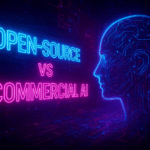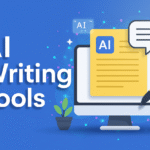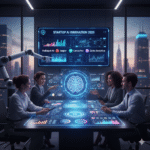Imagine a world where machines think, create, and even make decisions. This isn’t a scene from a sci-fi movie; it’s the reality of artificial intelligence today.
But as AI becomes more integrated into our daily lives, a question arises: is AI legal or illegal? You might wonder if using AI in your business or personal life could land you in hot water. The truth is, the legality of AI isn’t black and white.
It’s a complex issue that affects everyone, from tech giants to individual users like you. We will unravel the legal landscape of AI, exploring where the line is drawn between innovation and regulation. Stay with us as we delve into the nuances and help you understand what it means for AI to operate within—or outside—the law.
Legal Status Of AI
The legal status of AI is a hot topic today. Many wonder if it’s legal or not. The answer isn’t simple. AI’s legality depends on several factors. These include its use, region, and specific laws. Let’s delve into the legal aspects of AI.
Legal Frameworks Governing AI
Different countries have their own laws for AI. Some nations are stricter than others. The European Union has strong regulations. They focus on privacy and data protection. The United States has varied rules. They depend on the state and type of AI.
AI in Criminal Law
AI use in criminal law raises many questions. Can AI be held accountable? Most legal systems say no. AI lacks personal responsibility. Yet, creators can face legal consequences. They must ensure their AI complies with laws.
Intellectual Property Rights And AI
Who owns AI-created content? This is a debated topic. Some argue the creator of the AI owns it. Others say the AI itself should own it. Current laws often favor the AI developer. Intellectual property laws continue to evolve in this field.
AI and Privacy Concerns
AI often processes personal data. This raises privacy issues. Many countries have strict data protection laws. AI developers must comply with these. Violations can lead to hefty fines. Protecting user data is crucial for AI’s legality.
Employment Laws And Ai
AI impacts employment and labor laws. Automation leads to job losses in some sectors. Laws exist to protect workers’ rights. Employers must ensure fair practices. They need to balance AI use with human employment.

Credit: newsletter.cobaltintelligence.com
AI and Intellectual Property
AI’s impact on intellectual property raises complex legal questions. Legal or illegal? It depends on specific uses and jurisdictions. Understanding AI’s legal landscape is crucial for navigating intellectual property rights.
Artificial Intelligence (AI) has been making waves across various industries, but its impact on intellectual property (IP) raises important questions. As AI systems create art, music, and even inventions, the traditional frameworks of IP, such as patents and copyrights, are put to the test. How do we navigate the complex landscape where machines, not humans, are the creators?
Patents And Copyrights
In the world of patents, AI presents a unique challenge. Typically, patents are granted to human inventors. But what happens when an AI creates an innovative product or process? A real-world scenario might involve an AI system developing a groundbreaking drug. Would the AI or its developers hold the patent? This ambiguity makes it crucial for you to understand the evolving legal landscape and how it could affect your future innovations. Copyrights face similar challenges. Traditionally, copyrights protect works of art created by humans. But with AI generating music, art, and literature, who owns these works? Imagine you use an AI tool to create a digital painting. Does the copyright belong to you, the AI, or the company behind the AI? These are pressing questions for anyone involved in creative industries.
Ownership Of AI-generated Content
Ownership of AI-generated content is a hot topic. If an AI writes a novel, who gets the credit? It’s not just about recognition; it’s about control and revenue. Consider a business that uses AI to draft engaging blog posts. If the AI’s work becomes popular, who benefits financially? You must ask yourself how you would handle ownership and profit-sharing in such scenarios. There’s also the issue of accountability. If AI-generated content infringes on someone else’s IP, who’s responsible? This is a critical consideration for businesses and individuals alike. Understanding these nuances can help you protect your interests and navigate potential legal challenges effectively. As AI continues to advance, staying informed and proactive is more important than ever. Are you prepared for the implications of AI on intellectual property in your field?
Data Privacy Concerns
AI’s impact on data privacy raises legal questions. Many worry about data misuse and unauthorized access. Laws vary globally, making AI’s legal status complex and unclear.
In today’s digital age, data privacy concerns have become a hot topic. As AI technology continues to advance, the way it interacts with personal data is raising eyebrows. You may wonder if AI is legal or illegal, but the real question might be: what are the implications for your privacy?
AI and Personal Data
AI systems thrive on data. They learn and adapt based on the information fed into them. Think about all the personal data you share online—your search history, shopping habits, and even your location. AI uses this data to improve services and personalize experiences. But this raises a crucial concern: how much of your personal data is being accessed and stored by AI without your explicit consent?
Regulations And Compliance
Governments worldwide are grappling with how to regulate AI, especially concerning data privacy. Regulations like GDPR in Europe have set strict guidelines on data collection and usage. These rules aim to protect your personal information from misuse. However, compliance is a complex challenge for companies and developers. Are they truly following these guidelines, or merely checking boxes to avoid penalties? Ensuring compliance is not just about legality; it’s about building trust. When you use AI-powered services, do you feel confident that your data is safe and secure? It’s crucial for companies to be transparent about their data practices and for you to be aware of your rights. As AI continues to evolve, how do you see its impact on your privacy? Will stricter regulations be enough to protect your data, or is there a need for more innovative solutions?
AI in Employment Law
Artificial Intelligence (AI) is rapidly changing the landscape of employment law. As AI becomes more integrated into workplaces, it raises significant legal questions. These range from how AI affects job security to privacy concerns in the workplace.
Automation And Job Displacement
AI is transforming industries by automating tasks that were once performed by humans. This shift can lead to job displacement, affecting employees’ livelihoods. Imagine working in a company for years, only to find that your role is now automated.
It’s a scenario many fear, and rightly so. Legal frameworks need to address how businesses can balance automation with job protection. Should companies be required to offer retraining programs for displaced workers?
Having a plan for transitioning affected employees is not just ethical, but may also become a legal necessity. Governments and businesses must collaborate to create solutions that protect workers’ rights.
Workplace Surveillance
AI-driven surveillance tools are increasingly used to monitor employee performance. While these tools can increase productivity, they also raise privacy concerns. How much should your employer know about your day-to-day activities?
There’s a fine line between ensuring efficiency and invading privacy. Laws must adapt to protect employees from excessive surveillance. You should be informed about what data is being collected and how it’s used.
Transparency is key. Employees should have a say in how surveillance tools are implemented. Would you feel comfortable working in an environment where every move is tracked?
Addressing these issues requires clear guidelines. Legal frameworks must evolve to balance technological advances with workers’ rights. As AI continues to grow, so too must our understanding of its impact on employment law.
AI and Liability Issues
AI’s legal status varies across the globe, raising questions about liability. Laws struggle to keep pace with technology. Each country may have different regulations, creating a complex legal landscape. Understanding these differences is crucial for navigating AI’s legal implications.
Artificial Intelligence (AI) is transforming industries, but it also raises significant questions about liability. As AI systems make decisions without human intervention, it becomes crucial to determine who is responsible when things go wrong. This topic is not just theoretical; it can have real-world consequences for businesses and individuals alike. ###
Autonomous Vehicles
Autonomous vehicles are at the forefront of AI liability discussions. Imagine being in a self-driving car that suddenly malfunctions and causes an accident. Who is responsible for the damages—the car manufacturer, the software developer, or the vehicle owner? These questions are not easy to answer. Many jurisdictions are grappling with how to assign liability. Some suggest that manufacturers should bear the responsibility, while others argue for a shared liability model. This complexity can make you wonder, would you trust a machine with your life on the road? ###
Decision-making Systems
AI is also used in decision-making systems, like hiring algorithms or medical diagnostics. These systems can make errors, leading to significant consequences. Who holds accountability if an AI system wrongly denies someone a job or misdiagnoses a patient? In these cases, liability can be less clear-cut. Should the blame lie with the company using the AI, or the creators of the AI software? Or is there another party involved? Consider how you’d feel if a machine influenced a critical decision in your life. Would knowing who is liable make you more comfortable with AI’s growing role in decision-making? AI liability issues are not just legal challenges; they are ethical and personal dilemmas that affect us all. As AI technology advances, these questions will only become more pressing, calling for solutions that balance innovation with responsibility.

Credit: www.thebookseller.com
Global Perspectives On AI Legality
Artificial Intelligence (AI) is shaping our world rapidly. Its legality varies globally. Different regions have their own rules and views on AI. Understanding these perspectives helps in knowing the legal landscape.
United States
In the United States, AI legality is still evolving. Laws focus on data privacy and security. The government encourages AI development. Yet, concerns about bias and fairness exist. Each state may have its own rules. Federal oversight remains limited but growing.
European Union
The European Union takes AI regulation seriously. The EU aims to create a safe AI environment. It focuses on protecting rights and privacy. The GDPR plays a big role here. It regulates data use and privacy. The EU plans to introduce more AI-specific laws soon.
Asia-pacific
Asia-Pacific countries have varied AI laws. China leads with strong AI advancements. It focuses on AI for economic growth. Regulations here are state-controlled. Japan promotes ethical AI use. It values innovation with responsibility. Australia works on balancing innovation and safety. AI guidelines emphasize transparency and accountability.
Ethical Implications
Exploring the legality of AI raises ethical concerns. AI can impact privacy, fairness, and accountability. Legal frameworks struggle to keep pace with rapid technological advancements, leaving many gray areas.
The ethical implications of AI technology are becoming a hot topic as its presence in our daily lives continues to grow. As AI systems make decisions impacting various sectors, from healthcare to criminal justice, it raises important questions. How do we ensure these systems are fair, transparent, and accountable? ###
Bias And Fairness
AI systems often reflect the data they are trained on, which can lead to biased outcomes. If an AI model is fed biased data, it could make unfair decisions, perpetuating existing inequalities. You might wonder, how can developers ensure fairness in AI? Developers need to be proactive in identifying and mitigating biases in their data sets. Implementing diverse data can help AI systems make more equitable decisions. Regular audits and updates to AI models can further enhance fairness. ###
Transparency And Accountability
Transparency in AI involves making the decision-making processes of AI systems understandable. If an AI system makes a critical decision, you should know how it reached that conclusion. This is crucial for building trust and ensuring accountability. Accountability goes hand-in-hand with transparency. When AI systems make mistakes, who is responsible? Clear guidelines and regulations are essential to ensure that creators and users of AI can be held accountable. As AI continues to evolve, we must ask ourselves how we can uphold ethical standards. What role will you play in shaping the future of AI ethics?

Credit: www.vecteezy.com
Future Of AI Legislation
AI legislation is evolving rapidly, sparking debates on its legal status. Laws are being crafted to balance innovation and ethical concerns. Understanding AI’s legality requires examining both current regulations and future possibilities.
The future of AI legislation is a hot topic that has captured global attention. As AI technologies rapidly advance, governments and international bodies are racing to establish laws that ensure ethical and responsible use. The challenge is to balance innovation with safety, and the stakes are incredibly high.
Proposed Laws And Frameworks
Governments around the world are drafting laws to govern AI. The European Union, for instance, has introduced the AI Act, which aims to classify AI systems based on risk. This approach ensures that high-risk AI applications undergo stringent checks, while low-risk ones enjoy more freedom. In the U.S., lawmakers are focusing on transparency and accountability. Proposed bills emphasize the need for AI systems to explain their decisions. This ensures users know how and why an AI made a particular choice, enhancing trust. Have you ever thought about how these laws might impact the AI products you use daily? As regulations tighten, companies will need to adapt, possibly affecting the features and functionality you currently enjoy.
International Cooperation
AI is a global phenomenon, and its regulation requires international cooperation. Countries are joining forces to create a unified approach to AI governance. The Global Partnership on AI, for example, brings together nations to collaborate on AI policy. Such cooperation helps in setting universal standards. It ensures that AI systems are safe and ethical no matter where they are developed or used. This global effort also prevents regulatory discrepancies that could hinder technological advancement. But what happens if countries disagree on these standards? Discrepancies could lead to challenges in cross-border AI implementations, affecting everything from tech products to international trade. As you consider the future of AI, think about your role. Should you advocate for stricter regulations, or do you believe in fewer restrictions to foster innovation? Your voice matters in shaping the future of AI legislation.
Frequently Asked Questions
Is AI Legal In All Countries?
AI legality varies by country, with different regulations and guidelines. Some nations have strict laws, while others are more lenient. It’s essential to understand the specific legal framework in your region to ensure compliance with AI technology usage.
Are There Any Restrictions On AI Use?
Yes, certain restrictions on AI use exist, depending on the application and jurisdiction. Common concerns include privacy, ethics, and security. Regulations often focus on protecting personal data and ensuring ethical AI deployment, aiming to balance innovation with public safety.
What Are The Ethical Concerns Surrounding AI?
Ethical concerns include bias, privacy, transparency, and accountability in AI systems. Ensuring fairness and avoiding discrimination are critical. Developers must address these issues to maintain trust and compliance with ethical standards, fostering responsible AI growth and application.
How is AI regulated In The EU?
The EU has specific regulations governing AI, focusing on transparency, safety, and accountability. The AI Act aims to create a framework ensuring ethical AI deployment. It categorizes AI systems based on risk, providing guidelines for compliance and protection of fundamental rights.
Conclusion
Understanding AI’s legal status is crucial today. Laws differ by country. Some nations embrace AI with clear regulations. Others remain uncertain, causing confusion. Businesses must stay informed. Legal frameworks evolve rapidly. Keeping up with these changes helps avoid pitfalls. Educating oneself on AI’s legal aspects is essential.
Awareness ensures ethical AI usage. This knowledge protects individuals and companies alike. As AI grows, staying updated is key. Preparing for future changes is wise. Always consult legal experts for guidance. They provide valuable insights. Remember, knowledge empowers responsible AI use.




